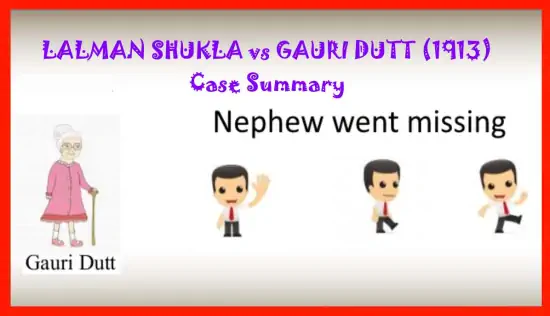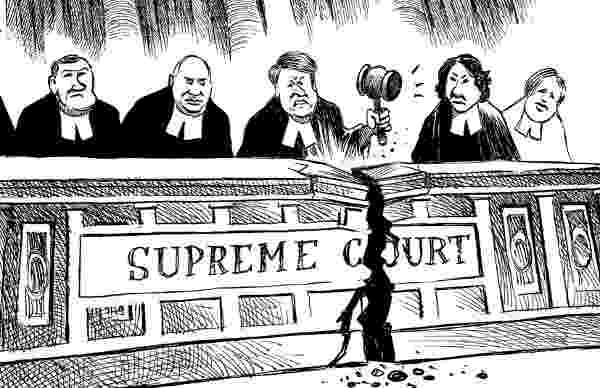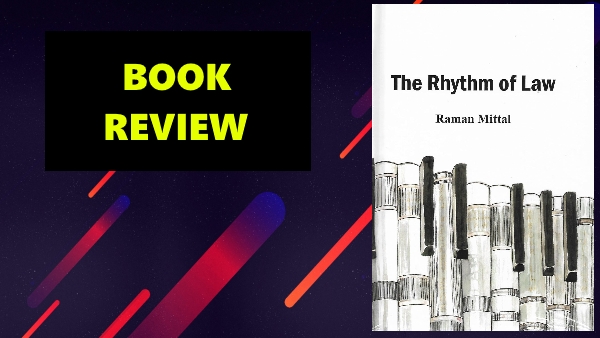Lalman Shukla vs Gauri Dutt case (1913) case examines the existence of a contract if there is no acceptance. Acceptance is that of a contract like a lighted matchstick to a train filled with gunpowder. No contract is complete without proper communication of acceptance, as given under Section 4 of the Indian Contract Act 1872.
FACTS
- The defendant’s nephew was absconded, and the defendant was unable to find him anywhere. The defendant realized the same and sent his servants to search for his nephew.
- Lalman Shukla (plaintiff herein) was one of the servants who had gone out to search. The plaintiff eventually found him and brought him back.
- While the plaintiff had gone to Haridwar from Kanpur to search, he was handed some money for his railway and other expenses.
- While Lalman Shukla was out, the defendant made an announcement to reward Rs.501 to whosoever found his nephew. Lalman Shukla found Gauri Dutt’s missing nephew and brought him back to his home in Kanpur.
- 6 months after the said incident, Gauri Dutt fired Lalman Shukla. After being removed from the job, the plaintiff claimed the money, which the defendant denied paying. Lalman Shukla filed a case against Gauri Dutt, his master, to claim the reward money.
ISSUES
- Whether Lalman Shukla is entitled to get the reward money for searching missing nephew?
- Whether there was valid acceptance between the two?
- Whether there was a contractual relation between the two?
CONTENTIONS
Plaintiff’s contentions
- Lalman Shukla strongly contended that he was entitled to receive the reward money from Gauri Dutt as he found the missing nephew.
- He stated that there is no need for prior knowledge emphasizing on Section 8 of Indian Contract Act 1872 which says, “Performance of the act or the acceptance of any consideration in a proposal is the acceptance of the proposal”.
- He said, “to have the knowledge of the condition was immaterial”.
Defendant’s contention
- The defendant strongly argued that the plaintiff had no knowledge about the offer and was not aware of it before finding the missing nephew.
- So an offer without the knowledge of the offeree cannot be accepted or there is no such condition where the plaintiff can accept the offer without its knowledge.
- Gauri Dutt emphasized Section 2(a) which said, “When one person signifies to another his willingness to do or to abstain from doing anything, with a view to obtaining the assent of that other to such act or abstinence, he is said to make a proposal”.
- Further on Section 2(b) said, “When the person to whom the proposal is made signifies his assent thereto, the proposal is said to be accepted. A proposal, when accepted, becomes a promise”.
- Therefore, the plaintiff had no knowledge about the offer made and there was no acceptance. So according to Section 2(h) of the Indian Contract Act 1872, since there was no acceptance, there was no agreement to be enforced by a court of law.
RATIO DECIDENDI
The case was filed in the Allahabad High Court and was presided over by Justice Banerji at the Allahabad High Court. In this case, it is derived that-
In order to enter a contract, 2 aspects need to be fulfilled:
- To have complete knowledge of the offer or the proposal.
- Acceptance of the offer.
To form a contract out of an agreement, to have knowledge and acceptance must be present. In this case, both were missing. When the plaintiff was searching for his master’s nephew, his obligations and duties were as a servant. Thus the plaintiff, Lalman Shukla was not entitled to get the award.
DECISION
The Court dismissed the appeal made by Lalman Shukla against Gauri Dutt. The Judge analyzed the facts of the case and said that to enter into a contract, there must be knowledge of the offer and acceptance of the said offer. Here both were missing, and the plaintiff fulfilled his duties as a servant to his master. Therefore, Lalman Shukla (plaintiff), was not entitled to get the reward money for searching Gauri Dutt’s missing nephew.
CONCLUSION
This judgment indeed is important for understanding the law of Contracts. It clarified that for an offer to be considered or accepted, knowledge and acceptance of the same is needed. This case discussed upon basic concepts of contract and vital elements of an agreement which are offer and acceptance. This is an important case of general offer and laid down the principles of general offer. Rewards attached to an offer made by advertisement or finding lost articles can be examples of general offer which is seen widely in today’s world.
BEST BOOK FOR CONTRACT LAW: Contract Law by RK Bangia (Latest Edition)






